- Home
- Sena Jeter Naslund
Ahab's Wife, or the Star-Gazer Page 4
Ahab's Wife, or the Star-Gazer Read online
Page 4
OH, MY LOST AHAB. I had my prayer then, if not my God: Let the green land and the warm hearth call you home. As surely as after our first night in the marriage bed, the sea called you away.
If I turn back the years, Justice is standing in the water, but he hears me over the surf and turns to wave. He is five years old, his hair black as soot. Though the hair of your head, Ahab, was gray and white, yet you were still sooty in the loins, as young as my first husband when he was eighteen and I was seventeen.
I met my first husband when he visited my aunt and uncle, who kept an island Lighthouse out from New Bedford, but first I must turn back more years to say how it was that I who was born in Kentucky on the banks of the Ohio came to be with Aunt and Uncle near New Bedford. When I was twelve, my mother sent me there to save my life, for she was afraid that my father would kill me.
CHAPTER 5: The Window
WHAT INCITED my father to fury was my lack of Christian belief. I wanted no part of the church because I could not believe its dogma. Perhaps there was some imbalance in my brain—I don’t know. But the belief that was imbibed by everyone I knew, with scarcely a moment of skepticism, seemed to me most unlikely. Whether there was God or not, I admitted I did not know, but it was Jesus as God, or the Son of God, that seemed to me highly unlikely.
How do you know it’s true? I asked. One would say that the Bible was God’s holy word and that it said so, but I saw no reason to think it holy just because that was the custom. Did I not feel myself a sinner? they would ask. Readily did I acknowledge I had many shortcomings, but why should I think there was a hell waiting to swallow me? And what was the evidence that any part of me was immortal? Perhaps I just wished it so. And how could belief that one good man, long ago, was actually the incarnation of God wipe away my sins? What possible connection could there be between the two ideas?
“If you believe the sky is red,” I said to my father, for I had a small paring knife in my hand and was peeling the waxy red skin from an apple, “would it make the corn grow?”
At this, my father struck my face with his open hand. “Believe!” he shouted.
“Neither you nor I can command belief,” I replied, though I was only twelve. I was shocked not so much at the blow but by the calmness of my own voice. But tears had jumped into my eyes.
He harnessed the buggy and rode away into the woods, lashing the horse.
I watched through the cabin front window, which had just been unboarded from the winter. Often, as a younger child, I had followed him into the yard, sat upon the stump, lamented his leaving. No longer! Now, from the house I read him, crossing the window left to right, how the harried buggy and his flailing arm moved as a unit from the left pane of glass to the right pane of glass, and out of sight. How undisturbed the trees seemed in their dark uprightness, how intact in their neatly fitting bark. My father had seemed so till his recent conversion.
I ceased looking through the window in order to contemplate the wavy glass itself. What was a window but a machine for making the opaque transparent? Then I regarded the window framing, which divided the four small lights by a slender, equal-armed cross between the panes.
My mother came to sit at the table. She remained unconverted. Why did his wrath not fall on her? With her hand and arm she swept her dress to one side from beneath her bottom as she sat. I registered that competent, automatic gesture, and the way her face shone at me in sympathy. With a light stroke, her fingers acknowledged the smarting of my cheek.
“What are we to do with your unbelief?” my gentle mother asked.
“Let him accept me as I am. As you do. As we both are.”
“It’s through my blood that tolerance and unbelief have run to you.” She gestured that, twelve-year-old girl though I was, I should come and sit on her lap. “My father was a Quaker of Rhode Island,” she said. “And my sister is a Unitarian.”
I had never heard the word Unitarian before, for all about me were Methodists, like my father, and Presbyterians and German Lutherans; I had heard them speak of Catholics, but I had never seen one.
“Do you believe in Jesus as God?” I asked my mother.
“Most do,” she said.
“But you yourself?”
“It does not matter to me if Jesus was God or not.”
“It does not matter if a person can really be God?”
“It would have been a long time ago.”
I sat on her knee and listened to a bird sing. Mine was a darting mind, and it darted after the bird and its world, while I partly talked with my mother. With its song of Pretty, Pretty, Pretty, I imagined its crested red among the high green leaves of the tulip poplar, and then, again diverted, imagined the way light shone through leaf so that you can see compartments and veins within the thin flatness.
“Think,” she said. “Does it matter to you whether Caesar captured Gaul or not? If you think, ‘Why, yes, he did,’ are you not the very same girl sitting on her mother’s lap? And if you think, ‘No, I don’t believe he did,’ don’t you love me just the same as before and hear the same bird singing?”
Her eyes were dark brown, and she never spoke seriously without a sheen of love over her eyes.
“It might be quite a different thing about God,” I said.
“If it makes you happy, believe it.”
“But I want to know the truth.”
Again she was silent, then she sighed. “The truth about the unseen makes little difference to me.”
“It would make a difference to me,” I answered. “But I do not believe that a man was God.”
“Perhaps we each adopt or create our truth.”
When my father returned, he was morose. “Struggle with the devil,” he told me. “I will ask you again in a week.”
The next day the dog, King, playfully chased a pullet, and when my father called the dog, he disobeyed. Reaching over the door for his long rifle, my father stood on the threshold and shot the dog.
He said, “The Lord has given man dominion over the creatures of the earth.”
I climbed the tallest white pine I could find.
Nonetheless, when he next asked about my belief, he found that the week was to no avail. Nor the months, though my father’s rage at his helplessness compounded, and each time he struck me, he added a blow. “Children, obey your parents,” he thundered. Each time I watched him drive away in a fury, lashing the horse, the buggy rattling across the yard. I watched him through the window, the cross of its mullions interpreting the scene, as he drove from the left side of the window to the right, and out of sight. I thought of him as a crusader; I saw his head as though it were encased in a gleaming helmet. I saw him as zeal-driven as those warriors of old, violent in their love of Christ, approaching unbelief with raised sword. I had read Ivanhoe, one of two or three dozen books my mother kept in the humped trunk.
Once my father did not drive away, but stood in the cabin door holding the buggy whip. My mother stepped before him and said only “No.”
He went into the yard and lashed the little stump where I liked to sit till foam came to the corners of his mouth, and he fell in a faint. Then my mother tore a strip from the hem of her green dress, wet the cloth, went to him, and bathed his forehead. She crooned his name, Ulysses, Ulysses.
That night my mother asked me if I would consent to live with her sister. “She is a Unitarian,” she said again. And when I asked my mother what that meant, she said, “With her, you can believe what you will. Only your behavior must be according to what is commonly held to be good. You must be kind. As you always have been.”
And that is how I came to live at the Lighthouse.
The Lighthouse itself became my church, my single tall tree trunk, my faith in stone and earth, and, eventually, my conduit to the sky.
CHAPTER 6: The Steamboat
MY MOTHER and I journeyed downriver by buggy to start our voyage up. (Is it not the case that many a life journey starts out in the opposite direction to its destiny?) Our land was locate
d some twelve miles north of the Falls of the Ohio, where the city of Louisville had sprung up at the portage. Steamboat travelers, as well as freight, were obliged to disembark on the upriver course and to change boats, Louisville being the northernmost port for those who had traveled up the Mississippi and then branched to the right, leaving the muddy waters of the Mississippi for the clearer water of the Ohio. Though the falls were rather low, they were unnavigable.
The night before our journey, our trunks standing like dark twins before the small summer fire, my mother had negotiated with my father that she alone would drive us to the Falls and then hire a boy to return the buggy, as she would travel with me all the way to her sister’s home.
“Certainly you will return, Bertha?” An anguish masked my father’s eyes—not that I was being escorted to a tiny island populated by only one family but that my mother might decide not to return to him.
For a moment I dared hope that she would not return, but a glance at her loving, loyal face, even before she spoke the words he needed to hear, told me otherwise.
The morning of our departure, after loading the trunks, he seated himself on my stump in the yard. I almost passed him without looking at him—for I loved my Kentucky home that I was being forced to leave—but I could not. He loomed like a black rock whose size and shape I must register in order to pass safely around. But I looked in his eye, and it was as though lightning leapt from both of us! Instant and powerful, undeniable connection!
“Una!” He ejaculated my name, and I ran to him for a farewell embrace.
His hands on both my shoulders, he pushed me back to look again into my eyes. His voice choked, he croaked, “Doubt not that I love you.” I made one quick nod and fled to the buggy.
From my seat I looked back at him as the wheels began to turn. I waved, one quick pass of the palm through the air—his style of wave—and thought now we were reversed, now he sat on the stump and I rode away in the buggy. I knew that he was sad. And much more.
AS WE PASSED through the woods, though it was a warm day, my body felt cold, especially my hands, which were clinched tight into fists. On either side of me I pressed my cold knuckles against the buggy bench for balance. Before long, my mother transferred both reins to one hand and with the other covered my cold fist. My hands felt as though they had turned into toads or stones. Her palm was warm and comforted me, but it was also damp as though her hand had been crying.
Because I did not want her to think I was indifferent to her comfort, I uncurled my fingers, turned my hand over, and returned her clasp. Still, my torso felt petrified, the fibers of my being turned insentient.
As we stood on the street admiring the steamboat, a plume rose from her and immediately a blasting sound that reverberated up from my feet, through viscera, and out the top of my head. I was surprised it did not lift my scalp and attendant hair as though I wore a wig. And with this mighty noise gush, I was blasted from numbness back to life. Like gunpowder clearing the river of ice, the sound cleared me and life flowed again, seeking its own expression and adventure.
I gasped, my mother looked down at me, we exchanged excitement, wonder, hope, even happiness at our decision, and stepped forward. Thus began our upstream journey. When I looked down at the giant wheel turning, I thought of Don Quixote’s windmill.
A STEAMBOAT is a pretty thing, trailing its black cloud; to tour its tiers, to look out at the slowly passing landscape are activities so purely recreational that one feels deliciously leisured. Sometimes a drab barge, headed west, would pass us. We gloried in the white-glazed gingerbread of our railings and our knowledge of the appointments within, the shined brass and the velvet seat covers. We felt valuable and promenaded the balconies daintily, stopping at the railing first on the Kentucky side and then on the Indiana side to admire the vistas.
We walked past one gloomy section. On a bulletin board affixed to the cabin were tacked several Wanted posters, advertising Rewards for runaway slaves. I yet remember three of these declamations and the Value they attached to Property:
Wanted
Large, strong, coal-black $800 male Shifty eyed,
bit-broke teeth on left
Clover-leaf brand left shoulder
Dangerous and Desperate
$50 for information
$500 for return to Sweet Clover Farm
Tidewater, Virginia
WANTED
CLEVER SMALL MALE MULATTO, CAN MEND SHOES AND
DO OTHER LEATHER SEWING. SCARS IN LEFT PALM.
MAY TRY TO PASS FOR FREE WITH FORGED PAPERS.
CAN READ SOME AND IS VERY TRICKY.
STABBED OWNER TO DEATH.
RETURN LEFT HAND FOR REWARD
$1,000
SHERIFF AND CITIZENS OF CHOCTAW COUNTY, ALABAMA
GONE SINCE EASTER 1820
Negro Wench and Daughter
$1,200 Reward for Both Unharmed
Mother is Pecan-colored; daughter almost white but with broad nose and dark freckles, gold eyes
Mother may be in family-way; daughter about 12, unbroke
Last seen New Year’s Day 1822
Take to New Orleans Dock: Mr. Beauchamp
When I walked with my mother I did not look at the posters because it seemed degrading to even glance at the offering of blood money. Whenever I promenaded the deck alone, I stopped and read the notices in horrible fascination. The girl with the golden eyes was my own age. There were three notices with sketches of men who looked through me at the passing Kentucky shore, but I did not think the pictures would be of much use in apprehending any particular slave. The runaways had been drawn so as to look more or less alike, as though to be a Negro were simply to have certain lips and hair. All the eyes looked haunted and frightened.
After supper but before we retired to our sleeping berths, Mother said, “Come, Una,” and took me for another stroll on the deck. The sun was setting and breezes had come up. Most women and children had gone straight to bed and the men to the card room. The stench of cigars polluted one section of our walk. Mother pointed out how the smokestack blew a dramatic black plume across the red of the western sky. Someone played an accordion from within. I peeked in to see an old black man with tight-curled, snow-white hair hunched over the squeeze-box, an unvarying smile carved into his face, his eyes focused on the floor. Sometimes he closed his eyes as his fingers flew over the buttons and keys.
Mother walked me around to the rear, on the Kentucky side, where the posters hung. Without hesitation she grasped the edge of the paper bearing one of the sketches and ripped it from the cork. The tacks burst out. She dropped the page over the side into the river. My heart leapt, for in small print on each sign was the instruction: Do not remove.
I grasped the one from Sweet Clover Farm and mailed it over the side and into the water. I ripped off the poster concerning the Mother and Daughter and would have cast it into the wheel to be churned into bits, but Mother stayed my hand.
“Over the side! It might be bad luck to grind them in the mill.”
So I cast the heinous advertisement over the side. It curled and rode the water a bit. I was glad when it swamped and sank, its message never again to be read.
“Would I had the nerve to do it,” my mother said, “by light of day.”
We were both agitated and walked to the prow of the boat so that the breeze might cool our faces. We liked having our backs turned to that infamy. I fancied the boat moved more swiftly against the current as though unburdened not of ounces but of tons and weighty years of guilt. My mother spoke through her teeth: We hold these truths to be self-evident, that all men are created equal, that they are endowed by their creator with certain inalienable rights, that among these are life, liberty and the pursuit of happiness. In my feet, I felt the vibrations of the heavy, turning wheel, propelling us forward.
CHAPTER 7: The Paddlewheel
WHEN MORNING CAME, I felt it still, the rhythmic, powerful turning of the wheel, and I decided to spend part of the day with it.
>
Painted a glossy, bright red, the wheel made me think at once of my own heart that beat my blood so that I might have life and movement. The wheel’s red paint was so thick as to look like enamel; the sturdy lathes were slick-armored against the ravages of water-wear. The wheel’s method was to gain purchase against the surface and to push itself forward as it encountered the resistance of the submerging water, but also it lifted the water in the rear and seemed to purify it. Cascades of bubbles, made all the whiter for pouring over the red paddles, sang of rushing glory. More powerful than any Kentucky stream splashing and dashing over smooth rocks, this turbulence shouted Red and White, White and Air, Splash and Foam till I was dizzy with it.
For an hour I watched the powerful, mechanical lifting of water and its immediate rush and fall back to the river, white foam yielding to the dun flow. Our wake was white-churned for only a short distance and then the seam we constantly opened was sealed over as though we had not passed. To myself as a young girl our passage seemed significant and momentous, as though it told me important things.
When we reached Cincinnati, the wheel turned more slowly and more slowly with less and less foam and splash till it stopped. My feet tingled after the vibration of the pistons ceased. In quietness we drifted a few feet till we were close enough to the shore for lines to be thrown and secured on the pilings. The gangplank was lowered, and Mother and I took a brief walk on the shore. I looked back at the giant paddle-wheel, wet and dripping, reared up, immobile as a statue. A gray engraving of a rose in a book came to mind, but enormous now and bloodred. It made me catch my breath—the paddlewheel—a gigantic rose, brilliant, red, perfect, still as eternity.

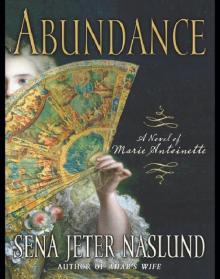 Abundance: A Novel of Marie Antoinette
Abundance: A Novel of Marie Antoinette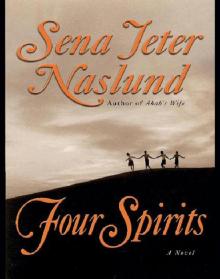 Four Spirits
Four Spirits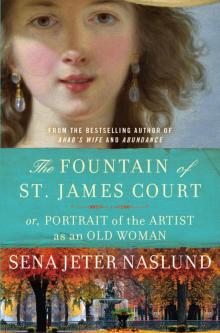 The Fountain of St. James Court; Or, Portrait of the Artist as an Old Woman
The Fountain of St. James Court; Or, Portrait of the Artist as an Old Woman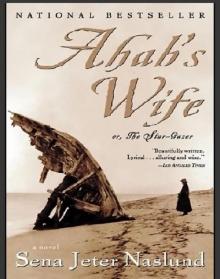 Ahab's Wife, or the Star-Gazer
Ahab's Wife, or the Star-Gazer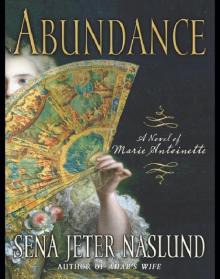 Abundance, A Novel of Marie Antionette
Abundance, A Novel of Marie Antionette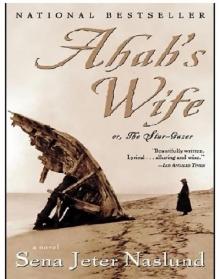 Ahab's Wife
Ahab's Wife